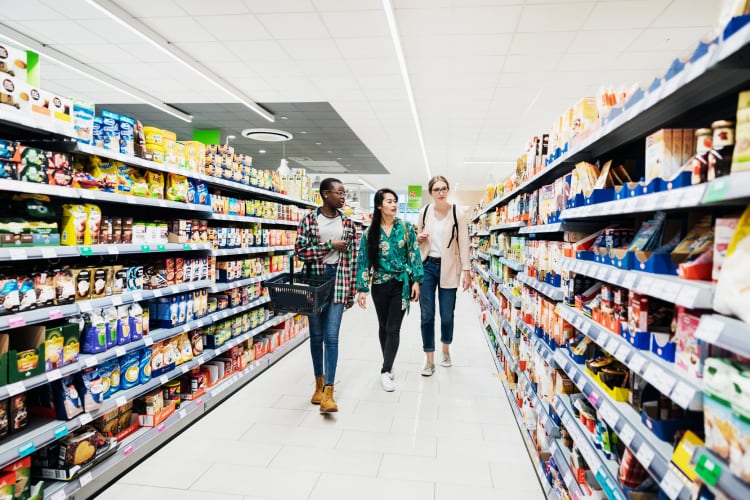It said restrictions would be pushed back following the “unprecedented global economic situation” and to give industry more time to prepare.
The government’s move to implement restrictions on junk food marketing and volume-based price promotions was seen as a key pillar to its obesity strategy and commitment to tackling health disparities.
But the Food and Drink Federation’s chief scientific officer Kate Halliwell welcomed the UK government’s ‘pragmatism during the cost of living crisis’. She said: “At a time when both families and our manufacturers are struggling with high inflation, it makes sense to delay the restrictions on volume promotions for everyday food and drink products, including breakfast cereals, ready meals and yoghurts, as it risked further stretching already pressed household budgets.
“We also welcome the delay to the start of advertising restrictions, given the time it will take our industry to prepare for the change in law.”
The food industry was not, however, united in its support for the delay.
The Consumer Goods Forum - which represents the world's largest manufacturers and retailers - encouraged retailers to act despite the delay. It claimed that in-store changes can help to nudge consumers towards healthier choices – and called on the industry to curb promotions which encourage shoppers to buy excessive volumes of unhealthy products.
“With UK obesity rates rising, urgent change is needed – and the intention behind HFSS legislation remains vital, even if enforcement is delayed. Regulation will always have an important role in driving change, but rather than waiting for legislation to force their hand, responsible retailers and food manufacturers must use their influence to ensure that healthier decisions become easier and incentivised for people everywhere.”
Some challenger brands also called the move backward step. Mission Ventures, which invests in many healthy brands that make low-sugar and low-calorie snacks, biscuits, dairy products and sweets, said it was deeply concerned about the government's U-turn on measures “set to protect children’s health and prevent childhood obesity”, adding that without the government's support, these brands “will struggle to lead the way to create a healthier society”.
Other brands were more phlegmatic. Dan Featherstone, founder of Made for Drink, which makes premium bar snacks, said he supported the move in spirit on the basis that his brand’s snacks are something to be enjoyed as a treat and not something to replace wholesome family meals.
“HFSS’s broader intentions are bang on - let’s not replace our family's meals with food that should simply be enjoyed as a treat. The bigger issue that has arisen is that the execution of a fundamentally sound idea was too vague and all-encompassing to succeed, which means good intentions have been unwittingly undermined. The latest U-Turn doesn’t surprise me, but as we’ve all come to recognise over last year since COVID, trying to do too much in one go loses focus.”
The premium snacks brand’s latest product is ‘Chip Shop Scraps & Fries’, designed to be enjoyed with a glass of champagne: a take on the ‘whispered truth’ that a bag of fish and chips and a glass of bubbly is ‘one of the most highly prized food & drink marriages of all time’.
“My gut reaction is that I fundamentally agree with the government: get cost of living under control and then implement HFSS in the way its intended. Treats as treats and fresh wholesome food for mealtime,” Featherstone said.
Ed Hauck, co-founder of the premium snack brand The Curators called the legislation a great opportunity for challenger brands 'to show their agility and bring relevant innovation to market'. "My view is that this legislation is overall a good thing for society - we have a massive obesity crisis and it needs legislative action," he said. "These latest delays don’t really make sense, buying chocolate bars on BOGOF isn’t connected to the cost of living crisis. The lack of clarity or certainty about the implementation of HFSS is not helpful - especially for small businesses who are constantly being swamped by red tape."
Public health experts warn of negative fallout
Public heath campaigners were unhappy with the delay, with the likes of Cancer Research UK urging the government to rethink its U-turn on a move, which it claimed will lead to healthier food options.
The charity has released a new analysis claiming that obese adults are set to outnumber those who are healthy within five years. The report estimated that more than 21 million UK adults will be obese by 2040, which equates to almost 4 in 10 of the UK adult population (36%).
The research also suggested that if current overweight and obesity trends continue, the number of UK adults who are overweight or obese may exceed this, reaching around 7 in 10 people, or 42 million people, by 2040, 71% of the population.
Cancer Research UK’s chief executive Michelle Mitchell said: “These projections should serve as a wake-up call to the government about the state of our nation’s health. Ministers mustn’t keep kicking the can down the road when it comes to tackling the obesity crisis – delaying measures that will lead to healthier food options.
“I urge them to revisit this decision and take bold action on obesity, the second biggest preventable risk factor for cancer in the UK.”
Dr Julie Sharp, head of health and patient information, added: “Government action is key in making sure that the healthy option is readily available and affordable for people and addressing the wider barriers that prevent people from living healthy lives. If these staggering trends continue, obesity will eclipse smoking as the biggest cause of cancer.”
Out of step with public opinion?
Meanwhile, a survey from survey by SPQR Communications claimed to reveal that most Brits would not support the introduction of controls on HFSS products.
In a YouGov survey of 2,000 people in a YouGov survey of 2,000 people 45% of people disagreed that HFSS products should carry mandatory health warnings, compared with 34% who agreed. Similarly, 43% were opposed to “tobacco-style” plain packaging for HFSS foods, with 34% in support of the move. And less than half of adults felt plain packaging would have any impact on their decision to buy HFSS products. The most sceptical were the over 55s.
When it came to the problem of childhood obesity, however, public attitudes hardened: nearly twice as many people supported as opposed the removal of brand-generated characters from HFSS products to make them less appealing to children.
How significant would an increase in regulation be?
It’s estimated that British shoppers currently spend some 40% of their grocery budget on HFSS goods, 15% of which goes to the types of products that will face the most restrictions. There have been varying estimates as to the financial impact on brands, with estimates ranging from revenue losses of anywhere between £27m and £1.2bn. Research by brand valuation consultancy Brand Finance has estimated that the potential value loss to businesses worldwide would be around $430bn if standardised packaging were extended to drinks, including alcoholic drinks alone.
Michael Coppen-Gardner, Managing Director of SPQR Communications, said the current approach to junk food follows the trajectory of tobacco control, with worrying implications for brand value.
“The playbook that was developed for tobacco control has been repurposed and applied to the new enemy of our times - obesity. From the soft drinks levy in 2018 to the recommendations of Henry Dimbleby’s National Food Strategy in 2021, interventionism is becoming the de facto approach for tackling obesity. But our research raises an important question for policymakers – namely, how effective will anti-obesity measures be if they are out of step with public opinion?”





